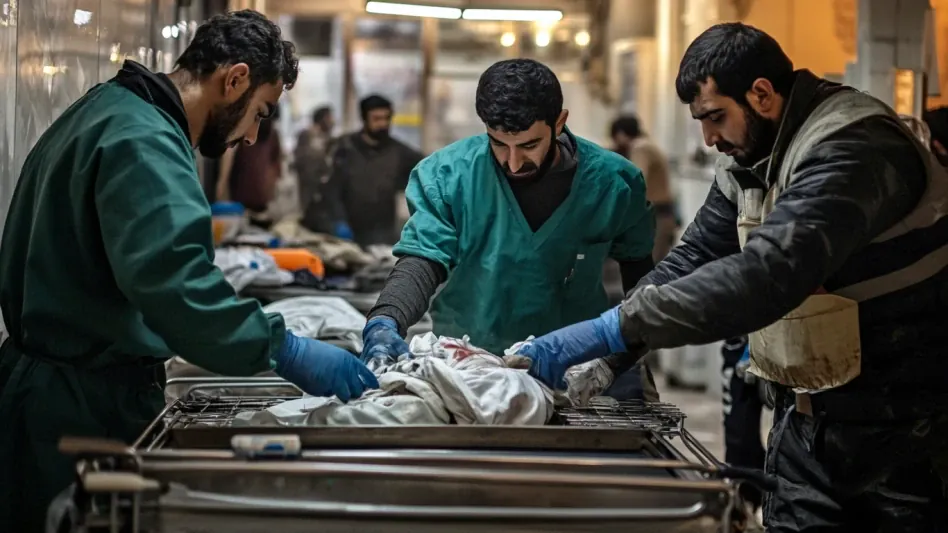In the wake of the devastating Syrian crisis, Jordan found itself at the epicenter of a humanitarian challenge that not only tested its resources but also its healthcare infrastructure. With an influx of Syrian refugees, Jordan’s healthcare system faced unprecedented strain. Leveraging a €43 million investment, the Syria Crisis Response Project, supported by the European Union Regional Trust Fund in Response to the Syrian Crisis (Madad), sought to overhaul the nation’s healthcare capabilities through strategic enhancements over five years.
Enhancing the Vaccination Infrastructure
Establishment of New Facilities and Sustainable Solutions
One of the significant achievements of the project was the establishment of a regional vaccination center in Irbid. This center did not just increase the geographical coverage of vaccination services but also brought necessary medical services closer to communities in need. It ensured that populations, both local and refugee, had access to timely vaccinations, a crucial factor in preventing outbreaks of preventable diseases. Additionally, the project equipped a national vaccination warehouse with solar energy, marking a critical step towards sustainable healthcare solutions. These advancements not only improve operational efficiency but also guarantee constant power for vaccine preservation.
Equipping the warehouse with solar energy addressed the dual challenges of energy reliability and environmental sustainability. In a country where the energy sector often faces constraints, such an initiative lessened the dependency on conventional power sources. By financing cold storage solutions, the project ensured that vaccines could be stored at optimal temperatures, significantly reducing waste and enhancing the shelf life of these life-saving drugs. These transformations played an instrumental role during the COVID-19 pandemic when the efficient distribution of vaccines became a matter of global urgency.
Training and Strategic Procurement
The project did not stop at infrastructural improvements. A comprehensive training program for healthcare professionals was integral to ensuring the long-term success and sustainability of these advancements. Training over 2,000 healthcare workers had a ripple effect, empowering them with the skills and knowledge to manage vaccinations effectively and efficiently. This widespread capacity-building effort increased the reach and effectiveness of the national vaccination program.
Moreover, the transition to a strategic vaccine procurement system was a remarkable achievement. This shift enabled Jordan to access quality vaccines at competitive prices, ensuring that financial constraints did not hinder public health initiatives. This strategic shift played a pivotal role during the COVID-19 crisis by enabling the timely acquisition of vaccines, medicines, and medical equipment. The enhanced procurement system thus not only improved Jordan’s health system’s resilience but also reinforced its preparedness for future emergencies.
Expanding Healthcare Coverage and Infrastructure
Comprehensive Approach to Improving Healthcare
European Union Ambassador to Jordan, Pierre-Christophe Chatzisavas, and World Health Organization Representative in Jordan, Jamela Al-Raiby, both praised the project for its expansive approach to enhancing vaccination coverage. The initiative was not limited to short-term improvements; it aimed at building a robust healthcare infrastructure that could evolve with future challenges. The strategy included constructing new warehouses to meet growing storage demands, rehabilitating existing ones to modern standards, and establishing a dedicated medical transport unit. This infrastructure ensured the safe and effective distribution of medicines and vaccines across the country.
The establishment of a medical transport unit marked a significant innovation. Ensuring that vaccines and medicines maintained their efficacy throughout transit was critical in preventing health crises. This medical transport unit, tailored to Jordan’s specific logistical needs, safeguarded the quality of medical supplies, reducing the risk of spoilage or inefficacy. These efforts collectively fortified Jordan’s supply chain, making it more resilient in the face of emergencies.
Impact on National Vaccination Program and Emergency Response
The importance of the project’s contributions to Jordan’s health infrastructure was underscored by Minister of Health Firas Hawari. The project significantly expanded the national vaccination program, enhancing Jordan’s ability to introduce new vaccines and respond to emerging health threats. The modernized infrastructure and trained workforce ensured that the nation was well-prepared for both regular immunization schedules and emergency responses. This preparedness was instrumental in managing crises and in providing uninterrupted healthcare services during pandemics or other emergencies.
Huda Ababneh, Program Director at the Ministry of Health, highlighted the project’s role in pharmaceutical security and universal health coverage. By ensuring that vaccines and essential medicines were procured, stored, and distributed effectively, the project guaranteed that healthcare services remained accessible to all. This approach not only reinforced Jordan’s health system but also aligned with global health objectives of universal coverage and equitable healthcare access.
Long-Term Benefits and Future Considerations
In the aftermath of the catastrophic Syrian crisis, Jordan emerged as a crucial hub for humanitarian aid, significantly challenging its resources and healthcare infrastructure. The influx of Syrian refugees placed an unanticipated demand on Jordan’s healthcare system, pushing it to its limits. To address this strain, the Syria Crisis Response Project was launched, backed by a €43 million investment. This initiative received support from the European Union Regional Trust Fund in Response to the Syrian Crisis, known as Madad. The project’s mission was to revamp Jordan’s healthcare services through strategic improvements over a span of five years. This investment aimed to not only enhance the capacity of healthcare facilities but also to ensure the delivery of quality medical care to both Jordanian citizens and Syrian refugees. As the crisis continued, these efforts were essential in stabilizing the region and providing much-needed support to those affected by the conflict.









